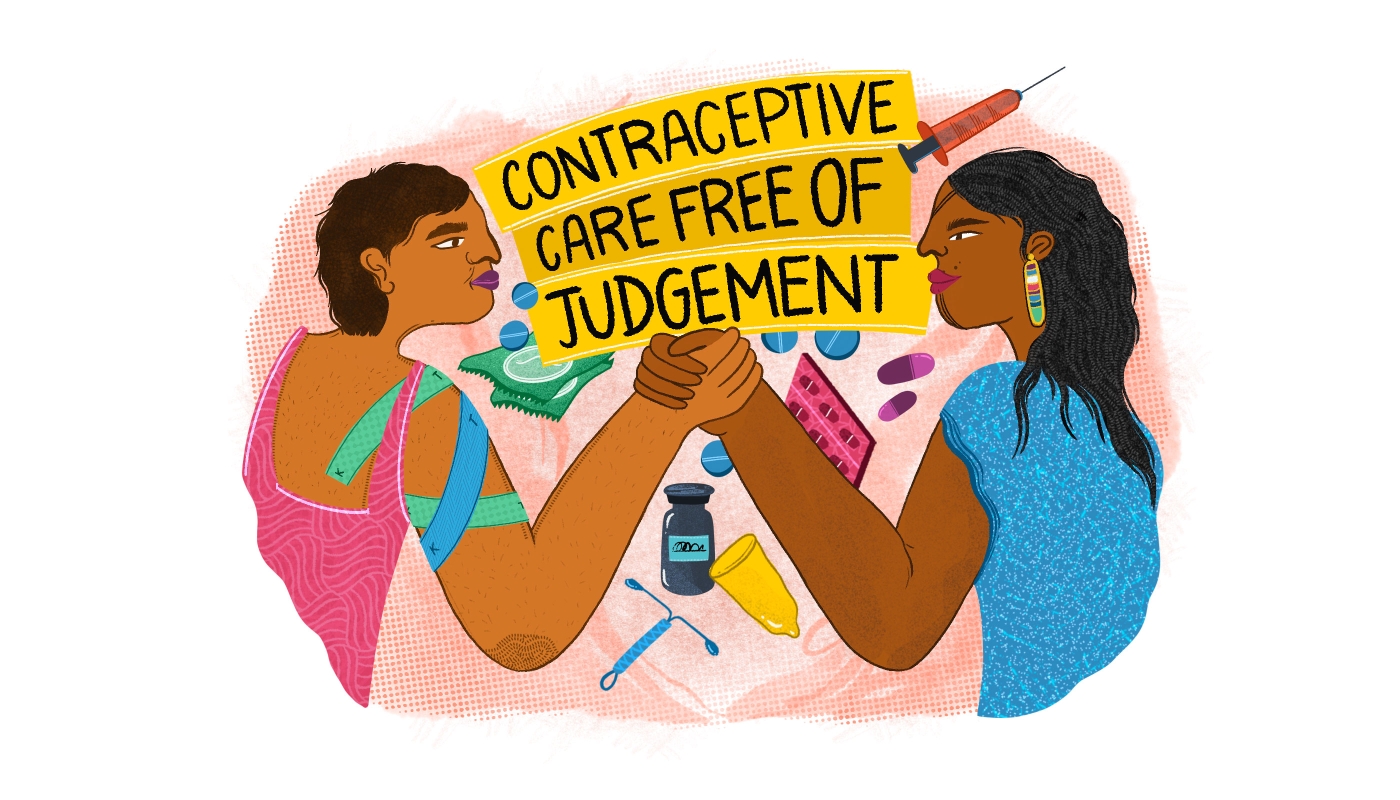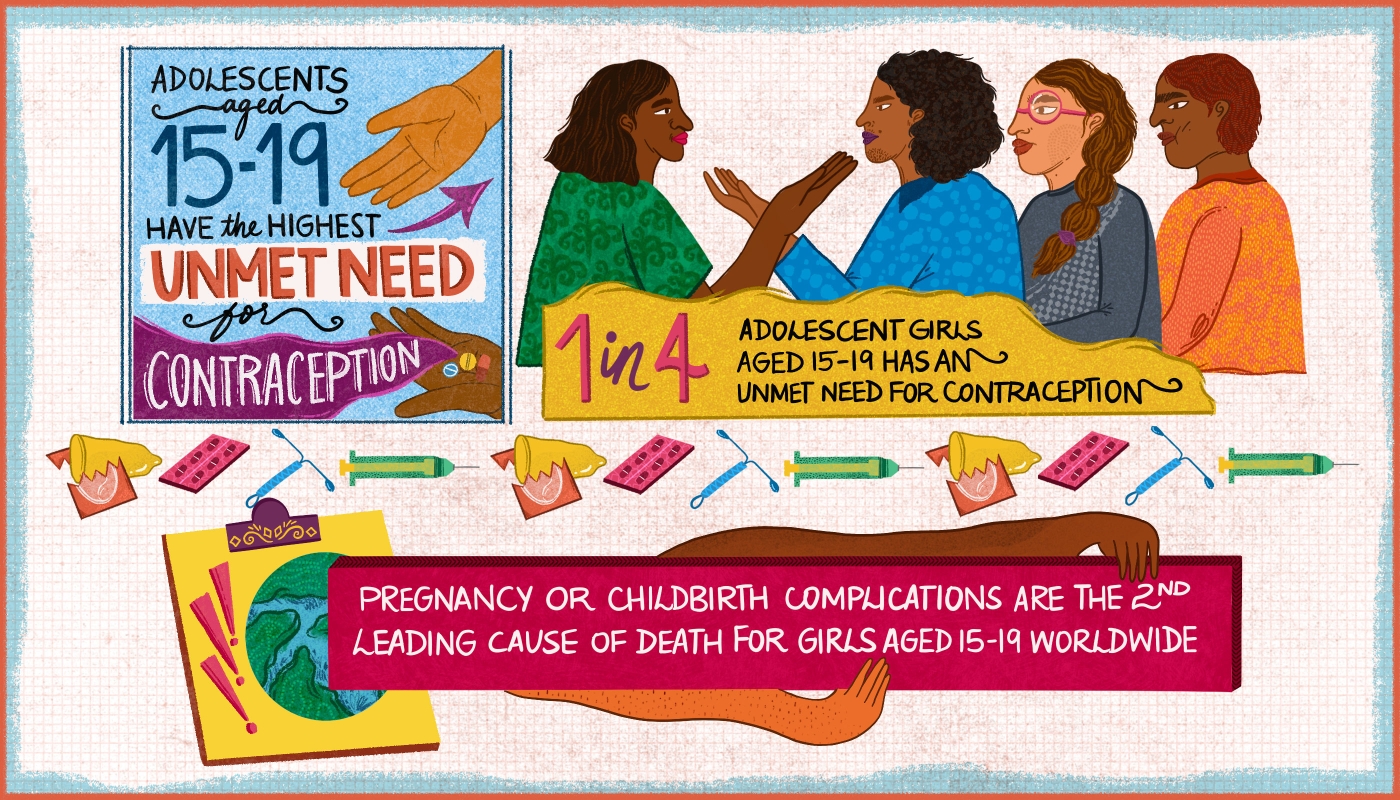Access to comprehensive contraceptive care is a universal human right that ensures individuals are able to freely decide how often, when, and if to become parents, as well as the spacing of their children. To respect, protect, and fulfil this right, governments must ensure that contraceptive information, supplies, and services are available, accessible, acceptable, and of good quality.

Available
A wide range of contraceptive methods, including emergency contraception, should be part of all countries' core list of essential medicines; only then are individuals (particularly women and adolescents) able to choose contraceptive methods that are appropriate to their needs. Availability also means that enough health facilities with trained personnel exist to meet the needs of the community.
Accessible
Services need to be physically accessible and affordable so that all people are able to obtain the health services they need. Accessibility also includes: access to information (including comprehensive sexuality education); access to reliable transportation; accommodations for persons with disabilities; respect for privacy and confidentiality of all persons; and the provision of services without discrimination.
Acceptable
Services must be responsive to the diverse needs of women, adolescents, and others throughout their different life stages. This also includes receiving information on the benefits and risks, effectiveness, potential side effects, complications, discontinuation issues, and danger signs of the contraceptive method chosen or proposed, as well as the right to refuse a procedure or drug at any point.
Good Quality
Services must be scientifically and medically appropriate. This requires, among other things, competent medical personnel, scientifically approved and unexpired drugs, appropriate hospital equipment, and proper sanitation. Good quality also means the provision of care that is free of stigma and judgement.
The Global Unmet Need of Contraception
Currently there are 218 million women with an unmet need for contraception; that is, women and adolescents who want to avoid a pregnancy but for a variety of reasons (including lack of access to contraceptive services) are not using any contraceptive method.
The unmet need for contraception significantly contributes to unwanted pregnancies. Globally every year, about half (49%) of pregnancies in low- and middle-income countries are unintended and women with an unmet need for contraception account for 84% of these pregnancies.
Adolescents aged 15-19 have the highest unmet need for contraception
1 in 4 adolescent girls aged 15-19 has an unmet need for contraception.
Pregnancy or childbirth complications are the second leading cause of death for girls aged 15-19 worldwide.

Contraception that is Free of Coercion
Receiving accurate, clear information without any pressure or coercion ensures a person can make free and informed decisions about their sexual and reproductive lives. An individual's personal beliefs, culture, and preferences, as well as their ability to use a given contraceptive method, decline, or discontinue its use must be respected at all times. People and communities subjected to marginalization and discrimination (including Indigenous peoples, communities living in poverty, persons living with HIV, and persons living with disabilities) have historically–and continuously–been coerced into contraception use and forced sterilization. This is a grave violation of human rights. Only when contraceptive decisions are fully informed, voluntary, and free of coercion and discrimination are the rights to comprehensive contraceptive care and bodily autonomy respected.
Why is access to contraception important?
- Because we are all entitled to make decisions about our own bodies, including decisions related to our reproduction and sexuality that are free from any pressure, discrimination, violence, or coercion.
- Because access to contraception is a universal human right. It is intrinsic to the exercise of sexual and reproductive rights and other human rights, such as the rights to health, life, non-discrimination, freedom of opinion and expression, and the right to work and education.
- Because access to contraception substantially reduces the risk for unintended pregnancies and supports people in making decisions about their fertility that are right for them.
- Because access to contraception, and safe abortion, is key to safeguarding women’s and adolescents' health. 1 in 4 adolescent girls aged 15-19 has an unmet need for contraception, and pregnancy or childbirth complications are the second leading cause of death for girls aged 15-19 worldwide.
- Because contraception is one of the most cost-effective investments in health.
Why Canada must Continue to Invest in Comprehensive Contraception Care
Canada is the fourth largest donor in family planning (including comprehensive contraception information, supplies, and services). This is a strong step forward, but more is needed.
Canada has committed to increasing its investments in sexual and reproductive health and rights (SRHR). Starting in 2023, a total of $700 million will be invested yearly in SRHR with a particular focus on the neglected areas of SRHR (adolescent SRHR, including comprehensive sexuality education, access to safe abortion services, comprehensive contraceptive care, and advocacy for SRHR). Canada has the responsibility to ensure these funds are rolled out effectively, transparently, and in line with human rights standards and meet the needs of women and girls and all persons of diverse genders and sexual orientations.
In line with its Feminist International Assistance Policy, Canada must also ensure that investments in comprehensive contraception care are part of an essential package of sexual and reproductive health services that is integrated into broader health systems. Alongside these health interventions, support for feminist and women’s rights movements advocating for legal and social change on SRHR is critical to ensuring the sustainability and national ownership of these systems.
